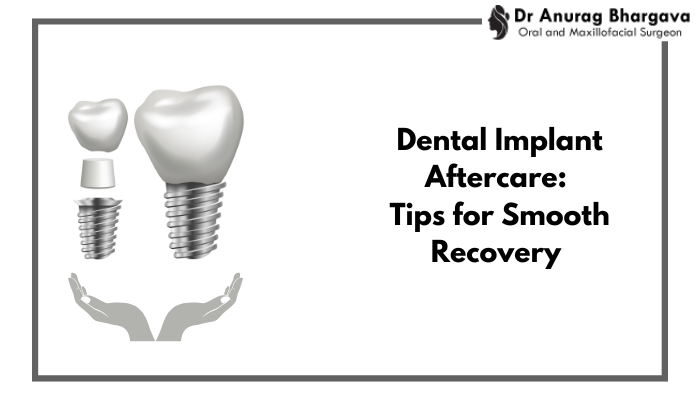Dental implants are an excellent option for those looking to restore their smile and regain full oral functionality. However, as with any surgical procedure, the recovery process plays a crucial role in ensuring long-term success. Proper dental implant aftercare not only aids in a smooth recovery but also guarantees the longevity of your new implants. In this blog, we'll walk you through some essential dental implant recovery tips and post-surgery care practices to help you on your journey to a perfect, long-lasting smile.
Why is Aftercare Important for Dental Implants?
Dental implants act as replacements for the roots of missing teeth and are surgically placed into your jawbone. The healing process—called osseointegration—is where the implant fuses with your bone to create a stable base for a prosthetic tooth or crown. Taking care of your implants during this period is crucial for avoiding complications such as infections, implant failure, or prolonged healing.
So, what can you do to ensure a successful recovery and the long-term health of your dental implants? Here’s everything you need to know.
1. Follow Your Dentist’s Instructions Diligently
First and foremost, listen to your dentist’s advice. Dental experts like Dr. Anurag Bhargava will provide you with detailed post-surgery instructions tailored to your needs. These will likely include guidelines on medication, diet, and oral hygiene that are essential for a smooth recovery. Ignoring these recommendations could slow the healing process or lead to complications.
2. Manage Post-Surgery Discomfort
It’s common to experience some discomfort after dental implant surgery, including swelling, bruising, and minor bleeding. While this is completely normal, managing these symptoms properly is key to ensuring a smooth recovery.
- Use Ice Packs: Swelling can be controlled by applying an ice pack to the affected area in short intervals for the first 24 hours after surgery. This will reduce inflammation and provide relief.
- Medications: Your dentist will likely prescribe pain medications or recommend over-the-counter pain relievers. Take them as directed to stay comfortable during the initial recovery phase.
3. Maintain a Soft Food Diet
During the first few days (or even weeks), you’ll need to stick to a soft food diet to avoid putting pressure on the surgical area. Foods like mashed potatoes, smoothies, yogurt, scrambled eggs, and soups are excellent choices. Avoid chewing on the side where the implant was placed and stay away from crunchy, hard, or spicy foods as they could irritate the area.
As your implant heals, you can gradually return to your normal diet, but it’s important to avoid chewing directly on the implant until your dentist gives the go-ahead.
4. Keep Your Mouth Clean, But Gently
Oral hygiene is essential for avoiding infections around the dental implant. However, you’ll need to be gentle around the surgical site to prevent irritation or injury.
- Mouth Rinses: Use a gentle, antiseptic mouthwash or a saltwater rinse to keep your mouth clean. Avoid vigorously rinsing for the first 24 hours after surgery, and when rinsing, be gentle to avoid disturbing the healing tissue.
- Brushing and Flossing: You should continue brushing and flossing your other teeth, but be very cautious around the implant area. Use a soft-bristle toothbrush and avoid brushing directly over the surgical site for the first few days.
5. Avoid Smoking and Alcohol
Both smoking and alcohol can interfere with the healing process. Smoking reduces blood flow to your gums, which can lead to delayed healing and even implant failure. Similarly, alcohol can interfere with prescribed medications and slow down recovery. It’s highly recommended to avoid these substances during your recovery period, and preferably in the long term to ensure your dental implants remain healthy.
6. Stay Hydrated
Drinking plenty of water is a simple yet effective way to promote healing. Hydration keeps your body functioning optimally and helps prevent dry mouth, which can lead to bacterial growth and infections. Make sure to drink water regularly, especially during the first few days after surgery.
7. Rest and Take it Easy
After your dental implant surgery, give your body time to heal by resting. Avoid physical exertion and strenuous activities for at least 48–72 hours after the procedure. This will help reduce swelling and bleeding. Let your body recover fully before returning to your normal exercise routine.
8. Attend Follow-Up Appointments
Your dentist will schedule follow-up appointments to monitor the healing progress of your dental implants. These visits are crucial to ensure that the implant is integrating properly with your jawbone. Your dentist will also check for any signs of infection or complications and adjust your aftercare routine if necessary.
9. Long-Term Care for Your Dental Implants
Once your dental implant has fully healed, it’s important to maintain good oral hygiene and regular dental check-ups to ensure the longevity of your implants.
- Brush Twice a Day: Use a soft-bristle toothbrush and low-abrasive toothpaste to clean around your implant.
- Floss Regularly: Make sure to floss between your implants and natural teeth to remove any food particles or plaque.
- Routine Dental Visits: Regular cleanings and exams will help prevent gum disease and ensure the health of your dental implants over time.
Final Thoughts: Ensuring Long-Lasting Results
Following these dental implant aftercare tips will not only help you recover smoothly but will also ensure the longevity of your implants. By being diligent with your post-surgery care and maintaining a good oral hygiene routine, your dental implants can last a lifetime, giving you a confident, healthy smile.
If you’re considering dental implants or have recently undergone the procedure, consult with a qualified oral and maxillofacial surgeon like Dr. Anurag Bhargava to receive personalized aftercare instructions and expert guidance for the best possible results.

